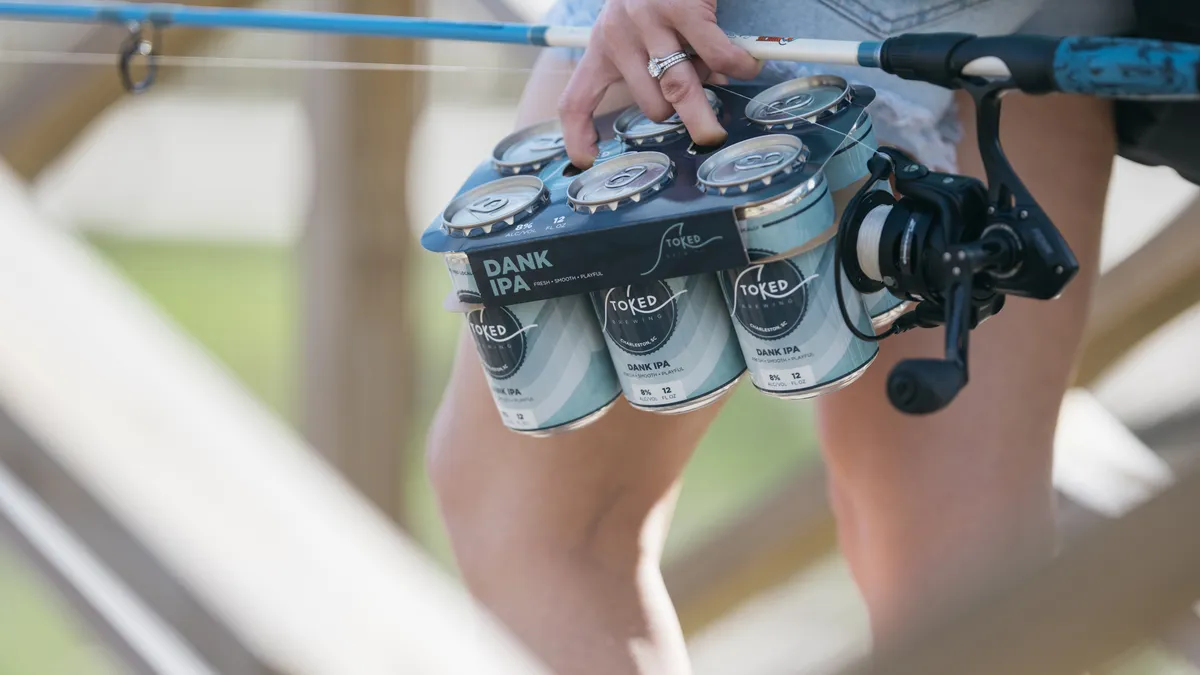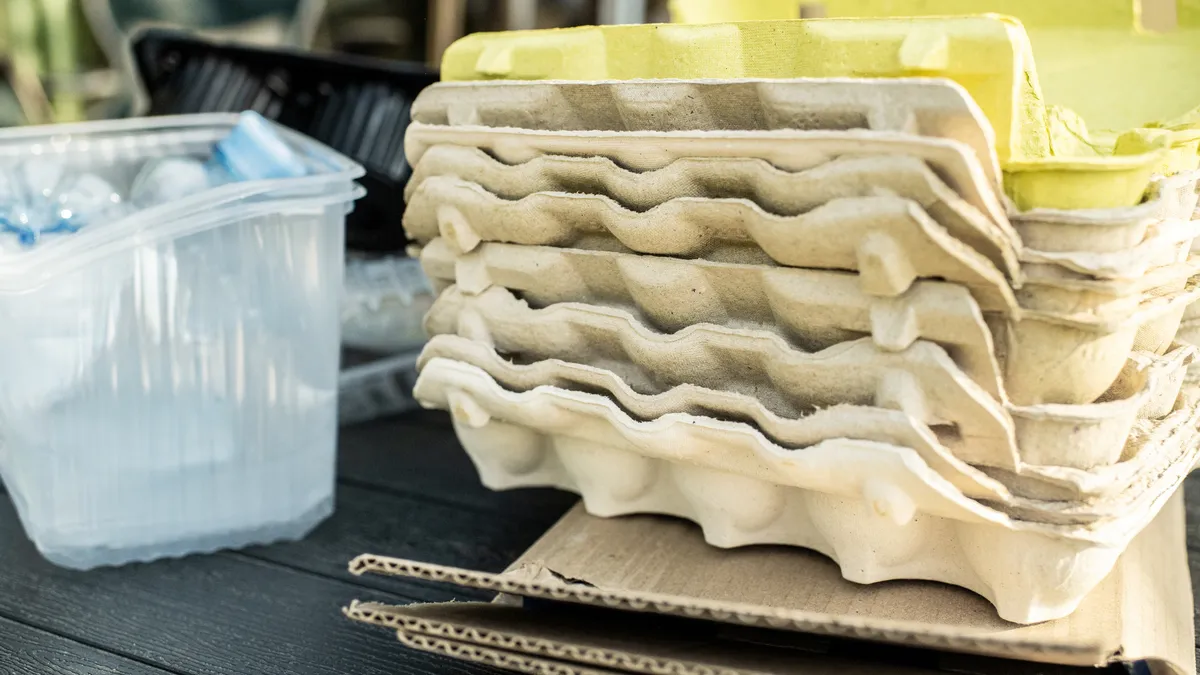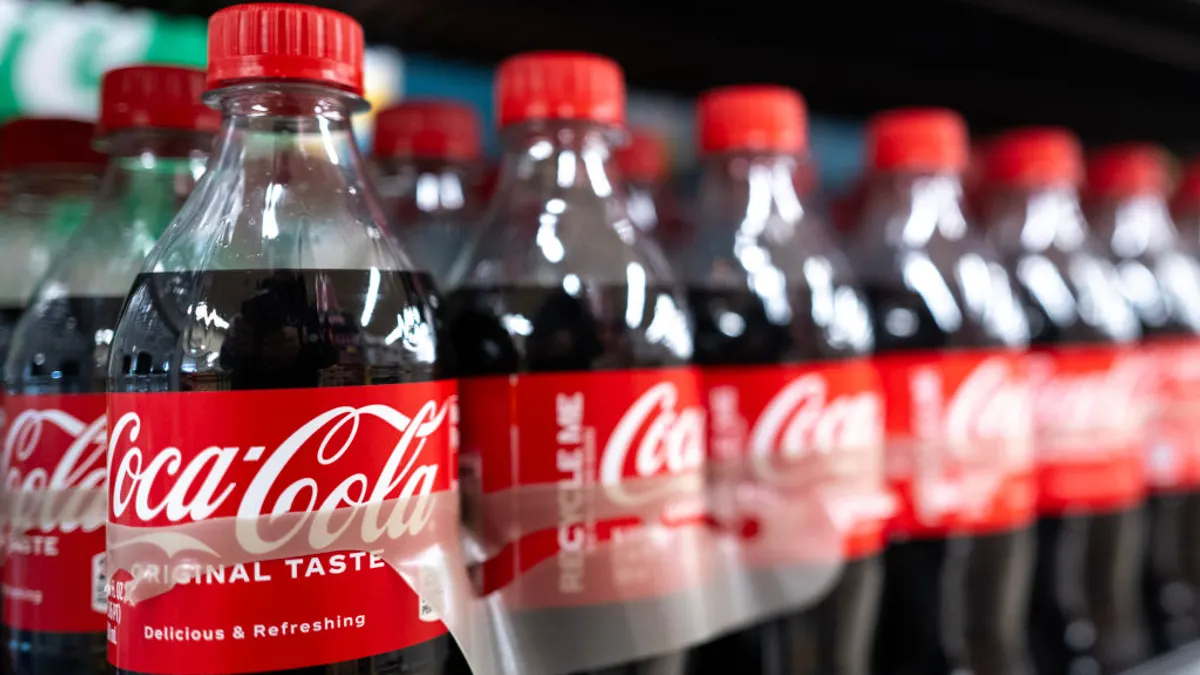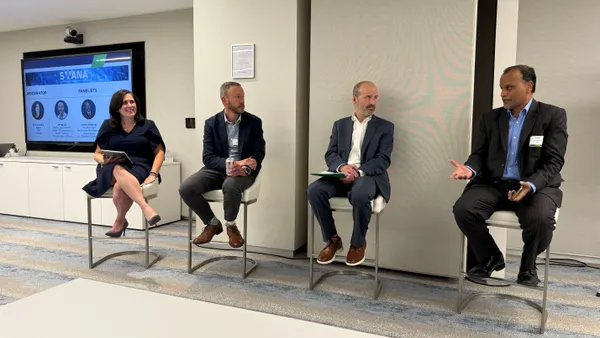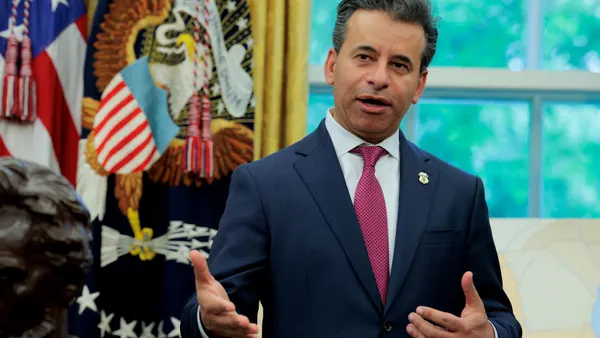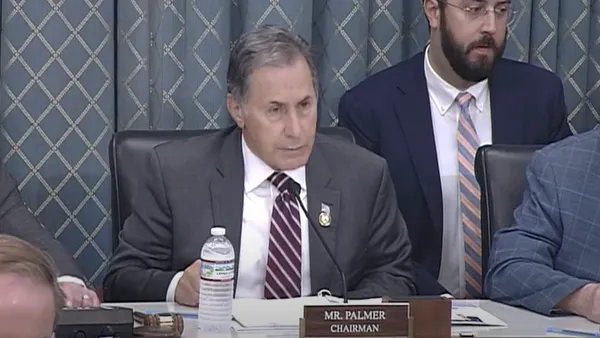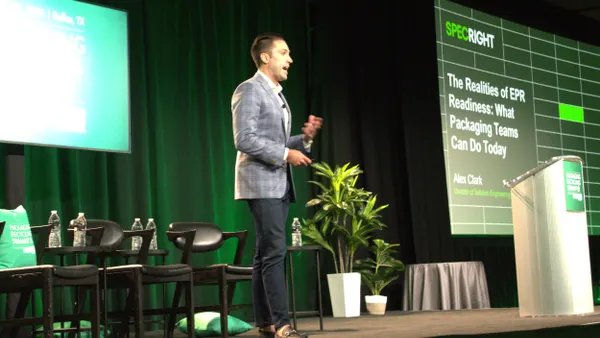While some packaging corporations are wary of regulatory changes on the horizon in the U.S. — namely a wave of extended producer responsibility policies — a family-owned company based in Wilmington, North Carolina, has made a point of speaking up and securing a seat at the table.
Atlantic Packaging has described itself as the United States’ largest independently owned packaging company, specializing in end-of-line packaging systems and materials as well as converted paperboard solutions. Its goals for achieving net-zero greenhouse gas emissions by 2046 were recently approved by the Science Based Targets initiative, which it said was a unique milestone among North American packaging companies.
Caroline James was working as an MBA intern at Atlantic and paying close attention at the time when the first U.S. states, Maine and Oregon, passed EPR for packaging laws. Now the company’s director of sustainability, in the past two years James has been notably vocal in EPR discussions, including promoting action in Connecticut this year. James said that Atlantic is supportive of packaging EPR as a policy framework and, as a largely substrate-agnostic distributor, hopes those policies will be set up to prioritize recyclability.
In an interview with Packaging Dive, James also discussed opportunities that come with operating as a private company and how sales force education and conversations with customers on sustainability are evolving.
This interview has been edited for length and clarity.
PACKAGING DIVE: What is Atlantic’s position on EPR? If it’s evolved in recent years, how so?
CAROLINE JAMES: Atlantic is very supportive of intelligent EPR programs that are going into effect. We think that it is an absolutely necessary policy lever to, number one, incentivize packaged goods companies to innovate and reduce their packaging, and also we see it as a critical funding mechanism to improve recycling and waste management in the states where it's going into effect.

I'm careful to say that we're in favor of ‘intelligent’ EPR because EPR is this kind of esoteric policy lever that can look very different in different places, and we've seen it look very different in different places. Even of the four states who have passed EPR laws for packaging, we see very different approaches and different priorities.
We think that it's really important that people from the packaging industry be at the table to say, ‘here's why this target is not very realistic,’ or ‘here's why these materials are difficult to make recyclable or compostable.’ We think that it is such a good way to foster collaboration and bring the right parties to the table, assuming that all of the right parties — including the packaging industry and packaged goods companies — are brought to the table.
So we just try to be very vocal about things, like: We need to think through the incentives that we're creating very carefully and think, what is it that we're trying to optimize for? Is it circularity? Is it carbon footprint? Is it renewable materials? Is it recycled content? Because sometimes, the things that we optimize for can be in conflict with each other because there is no one silver bullet for sustainable packaging.
You use the term ‘intelligent.’ I know others use ‘well-designed’ or ‘the right policies.’ The bottom line is it’s different versions of EPR. So are you able to specify what some of the priority parameters are for Atlantic?
One of the things that we want to make sure that we're thinking about when I say ‘intelligent EPR’ or ‘well-designed EPR’ is [that] as we're looking at the fee structures, we have a little bit of a fear that if things are too focused on weight, that you could wind up incentivizing more flexible plastics use because of lightweighting. And that may be the answer sometimes, but ultimately we would like to make sure that the fee structures are prioritizing and incentivizing curbside recyclability where possible.
We want to make sure that the benefit that a company gets in terms of fees from lightweighting their package, perhaps by moving to a flexible plastic, is not necessarily outweighing the benefit that they might get in terms of fees by moving towards recyclability.
Has Atlantic always been this outspoken on EPR? Have you all learned from the last few years about how to be effectively engaged going forward?
Generally speaking, corporations want to avoid having to comply with a whole bunch more regulations than they need to, especially state by state. But it just seemed like such a great market-driven way to be incentivizing the things that we wanted in packaging, as opposed to these kind of blunt bans on certain materials — which sometimes have their place, but EPR is just so much more of a policy-based mechanism that it felt much more elegant to incentivize each industry to do what they can and what is appropriate based on the application that they're dealing with ... Addressing packaging sustainability through policy was never going to be a one-size-fits-all policy.
So I think we've been very pro-EPR from the beginning, and we have also encouraged our customers to think of EPR as a positive because it's going to level the playing field for everyone to make sure that the companies that choose to do the right thing by investing in sustainable packaging are not at a competitive disadvantage to those who are choosing not to do anything about it.
For a company that has a staff of this size to be looking at these issues, I think that we've done a pretty remarkable job getting ourselves in the door to have these conversations because we are a very technical resource, ultimately. Yes we are a packaging supplier, but we ultimately do a lot of packaging consulting. And so I think being able to show that we are material agnostic, and that we sit in the middle of this very diverse, very dynamic supply chain, has allowed us to get into rooms.
There haven't been that many packaging companies that have been willing to come out in this strong support as we are, and part of that is thanks to the fact that we are a privately held company … Part of the purpose of where [President Wes Carter] sees this company going is shifting the supply chain in this direction. And so I think he feels very comfortable being a very strong proponent of EPR and not having to hedge in a lot of directions. We will be there through the nitty gritty to help make these policies strong.
Do you think it would be beneficial for other packaging companies to be similarly supportive and vocal on this issue? Do you foresee that happening more? And have you been able to connect with folks in similar roles at larger public companies?
I really wish that we could get a lot more packaging companies to be supportive of EPR. I think that's challenging for some of them because those who are manufacturers are kind of tied to the materials that they're using right now. And I think those who are in the plastics packaging space are concerned that EPR is just going to be this continued kind of ‘war on plastics,’ so they fear that there's no version of EPR that could be good for them. I think that that's a little bit short-sighted. The right kind of packaging is very different for different applications, and there are going to be applications for several years more that are going to require plastic.
I think the old saying of ‘if you're not at the table, you're probably on the menu’ is true, and that it will behoove all of us in the packaging industry and consumer packaged goods — manufacturers, distributors or retailers — to say, ‘you know, this is going to be easier to comply with and easier to innovate around than a plastic ban or a banning of a certain kind of other material. Because we in the industry know better than anyone how to make packaging that works.’
As far as collaboration to date has gone, I have found the most success with some of the big corporations like Coca-Cola and PepsiCo and Blue Triton who are kind of willing to come out and express [things like], ‘here's why we'rec in favor of EPR, here's how we think it needs to be well designed,’ etc. I really appreciate how vocal some of them have become recently. Some of the other CPG companies like Mars have strong positioning; they have to hedge a little bit more than we do sometimes because they're big publicly traded companies. And so they need to be really careful, and I totally understand that, but I appreciate that they have really sharp policy folks who are ready and able to have these conversations.
Since you took the helm as sustainability director, are there any particular strategies, ways of experimenting, or approaches to planning and making decisions about investments that you have implemented?
I think part of our philosophy that I have had a really easy time embracing … [is that] we are able to be material agnostic for the materials that we advise our customers to use. So a lot of packaging manufacturers have to say, ‘we think that you should use our product which happens to be made of X, because we happen to sell it.’
What's nice about Atlantic's position, where we are kind of primarily in that distribution space, is I'm able to be on the phone with these customers along with our sales force and say, ‘well, based on what you're trying to accomplish both from a performance point of view and from a sustainability point of view, we think you should use ‘Y’ material. You can also consider using ‘Z’ material, but here are the trade-offs that you're going to have.’ And so we're able to provide a little bit more of this kind of trusted advisor role rather than just, ‘hey, we need to sell as much packaging as possible.’
That has been really useful from a sustainability perspective. I really think it's a very privileged position to have as a sustainability professional, because you want to be able to be objective and to let the data drive the decisions and to think about how different every application really is. I mean, what works for packaging poultry is going to be very different from what works for an e-commerce shipment.
Part of embracing that, which can be a little bit sticky with customers or with our sales force, is that there is no one-size-fits-all silver bullet for sustainable packaging. For example, a classic kind of conundrum we often have is: Should we be using plastic because it has a lower carbon footprint, or should we be using paper because it's more recyclable and it comes from a renewable resource? And I think that we have taken kind of a different approach from others because they’ll just say, ‘you should be using plastic because X’ or ‘you should be using paper because Y and that's our position.’
We're all making very complex decisions on a whole bunch of different impact categories from circularity, to climate, to water, to ecotoxicity and human health ... And I think that that is more and more of the wave that we're going to start to see in sustainability, is this rightful bend toward honesty and transparency.
Are you engaged in educating your sales force on sustainability? I presume that everything that you’re learning and keeping up with in real time you’d want to trickle out to other folks in the organization.
We are doing a lot of education through [things like], I'll put together a three-minute video on: What is the difference between biodegradable and compostable, and why do we care, why does that matter? And kind of helping our sales force understand some of those issues.
Honestly, though, a lot of it — and this has surprised me a little bit — has been more about educating the customer than it is necessarily about educating the sales force. I think a lot of our customers in packaged goods feel all of this pressure to come up with sustainable packaging — whatever that means. And they don't know exactly how to start accomplishing that goal. They don't know what they should be looking for. Should they just be putting as much PCR as they can add to everything they have? Or does their whole suite of packaging needs to be compostable?
And so sometimes we find that our customers will ask us for things that we don't think are necessarily the best idea from a sustainability perspective. And then our sales force feels like they need to go out and source that thing. And instead, we're kind of moving to more of this model ... of saying, ‘You know what? We understand that you think that maybe you should move to a compostable e-commerce mailer; here's why we think from a sustainability perspective, that's not actually the best idea. Can we talk instead about what it would look like to move towards a recyclable e-commerce mailer?’
It’s very different from the typical model of just taking customers asking you for it and running with it. It's instead kind of being willing to push back on some of that and saying what from a sustainability perspective we think might actually be better. Just as much of this is about putting content out there to educate our customers to the extent that we can as it is about also educating our sales force. Now, I don't pretend that we have solved either of those issues. I think that this is one of the next stages of Atlantic's development in the sustainability journey — to find what are the best ways to do that.



